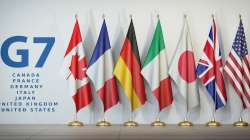G7 summit 2023: Who's attending, what will be on agenda | All you need to know
G7 summit: Japan Prime Minister Fumio Kishida stated that he is looking forward to welcoming the G7 leaders to Hiroshima.

G7 summit: Japan's Hiroshima city is all decked up as leaders of seven of the world's most powerful democracies will gather this weekend for the Group of Seven (G7) summit. The G7 grouping comprises of Japan, Canada, Italy, France, Germany, the United Kingdom and the United States. According to reports, security has been beefed up at the venues of the meeting where the world leaders are scheduled to discuss various topics.
Meanwhile, Japan Prime Minister Fumio Kishida stated that he is looking forward to welcoming the G7 leaders to Hiroshima. "From May 19 to 21, the G7 Summit will be held in Hiroshima, my hometown. Hiroshima is a beautiful city surrounded by the lush green Chugoku Mountains, facing the calm Seto Inland Sea," he said.
"I truly look forward to welcoming the G7 Leaders to Hiroshima. At the same time, as the world's attention turns to Japan this year, it will be a great opportunity to show the world the charms of our country, from beautiful landscapes, traditional culture and local foods to cutting-edge technology," Kishida added.
What is the G-7 Summit?
The G7 Summit is an international forum held annually for the leaders of its member states and the European Union (EU). This year is Japan's turn to host, but the presidency of G-7 summits revolves among the seven members. Meanwhile, leaders from some non-G7 countries and international organizations will also participate in some sessions as this has been a norm in recent years. During the meeting, the leaders discuss a wide range of issues, including economic policy, security, climate change, energy and gender.
This year, Prime Minister Narendra Modi will also attend the G7 summit on May 20-21. He is visiting Japan at the invitation of Japanese Prime Minister Kishida.
The first summit was in 1975, when France hosted what was then a Group of Six meeting to discuss tackling a recession that followed an Arab oil embargo. Canada became the seventh member a year later. Russia joined to form the G-8 in 1998 but was expelled after Moscow's 2014 annexation of Crimea.
Who else is coming?
This year, the leaders of Australia, Brazil, Comoros, Cook Islands, India, Indonesia, South Korea and Vietnam are invited, as Japanese Prime Minister Fumio Kishida stresses the importance of reaching out to developing countries in the so-called Global South and US allies and partners.
The invitations to leaders outside the G7 are meant to extend cooperation to a broader range of countries. The G7 countries' share of global economic activity has shrunk to about 30% from roughly 50 per cent four decades ago.
Developing economies such as China, India and Brazil have made huge gains, raising questions about the G-7's relevance and its role in leading a world economy that's increasingly reliant on growth in less wealthy nations.
Leaders of the United Nations, the International Energy Agency, the International Monetary Fund, the Organisation for Economic Cooperation and Development, the World Bank, the World Health Organisation and the World Trade Organisation are also invited.
What are the top agendas?
According to reports, G7 leaders are expected to strongly condemn Russia's war on Ukraine while pledging their continuing support for Ukraine. Meanwhile, Ukrainian President Volodymyr Zelenskyy will join the session via the internet.
There will also be a focus on Beijing's escalating threats against Taiwan, the self-governing democratic island Beijing claims as its own, and ways to reduce Western democracies' economic and supply chain dependency on China.
To address the rise of Global South nations, including many former colonies of Western powers with varied views on and ties to Russia and China, the G-7 will offer these countries more support in health, food security and infrastructure to develop closer ties.
Why Hiroshima for the summit?
As Hiroshima is Kishida's hometown, his choice of venue underscores a determination to put nuclear disarmament and non-proliferation at the top of the agenda of this year's summit.
A path to nuclear disarmament has appeared more difficult with Russia's recent nuclear weapon threats in Ukraine, as well as nuclear and missile development by China and North Korea.
Japan, which is protected by the US nuclear umbrella, has also faced criticism that its nuclear disarmament pledge is an empty promise. Kishida is trying to forge a realistic roadmap between the current harsh reality and the ideal of a world without nuclear weapons.
On Friday, May 19, the Japanese Prime Minister will welcome arriving leaders at the Hiroshima Peace Park. He also plans to escort the leaders to the A-bomb museum, in the first group visit by heads of nuclear states. There might also be a meeting with atomic bomb survivors.
(With inputs from AP)